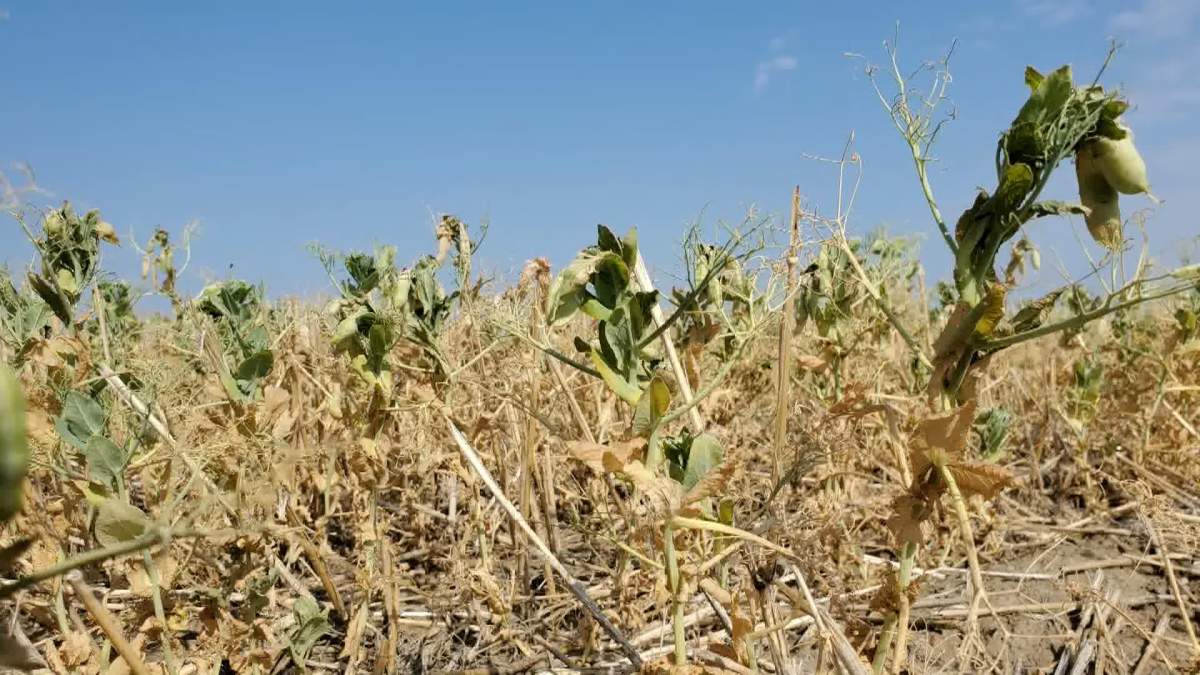Extreme heat and dry conditions are affecting crop conditions in Saskatchewan, with the majority in poor to good condition.

Saskatchewan Agriculture said in Thursday’s crop report that current weather conditions are causing crops to develop rapidly.
Crops are reported to be short, thin and impulsively advancing in many regions due to stress.
Sask Ag said 36 per cent of fall cereals, 29 per cent of spring cereals, 25 per cent of oilseed crops and 30 per cent of pulse crops are ahead of their normal stages of development for this time of year.
Yields and quality will be severely impacted without significant rainfall, according to the report.
Topsoil conditions continue to deteriorate due to the hot and dry conditions.
Cropland topsoil moisture is rated at 14 per cent adequate, 41 per cent short and 45 per cent very poor.
Hay and pasture land are rated at nine per cent adequate, 36 per cent short and 55 per cent very short.

Get daily National news
The Canadian Drought Monitor reported severe drought conditions in the Swift Current region and areas along the U.S. border at the end of June.
Moderate or severe drought conditions were reported by the CDM for most other regions, with an area around Lloydminster reported as abnormally dry.
Rainfall was reported in some areas of the province in the past week — 64 millimetres in the Foam Lake area, 32 millimetres in the Odessa, Mossbank and Humboldt areas, 29 millimetres in the Radville and Rockglen areas and 22 millimetres in the Avonlea area.
Haying operations continue, with livestock producers reported to have 26 per cent of the hay crop cut and 30 per cent baled or in silage.
Hay quality is rated four per cent excellent, 48 per cent good, 33 per cent fair and 15 per cent poor.
On Wednesday, the Saskatchewan government announced new measures for livestock producers struggling to feed their animals.
The Saskatchewan Crop Insurance Corporation is doubling the Low Yield Appraisal threshold values for customers who salvage their cereal or pulse crops as feed.
Additionally, the province announced a temporary funding cap increase for the SCIC’s Farm and Ranch Water Infrastructure Program to offset costs related to dugouts, pipelines and wells.
Saskatchewan has also asked the federal government to declare the entire province as eligible through the Livestock Tax Deferral program.
The province said grass is available, at no cost, for haying in highway ditches and rights of way. Since July 8, producers have been able to harvest any unclaimed hay without seeking permission of the adjacent landowner.
In the southern and central regions, hay in the ditches along secondary and rural highways is available on a first-come basis. Bales must be removed before Aug. 15.
In the northern grain belt, contractors will start mowing ditches and rights of way on July 15.
Sask Ag said the Farmers Stress Line is available 24 hours a day for any needed support at 1-800-677-4442.
The service is run by Mobile Crisis Services Regina and all calls are confidential.
—With files from Connor O’Donovan.








Comments